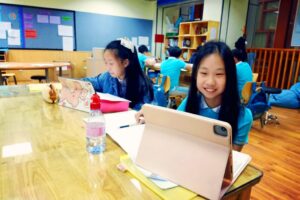
On the morning of September 26th, the WIS campus was filled with the rich aroma of coffee as a lively discussion on the PYP framework unfolded between parents and the school.
This pleasant Coffee Morning was hosted by Ms. Reinette, WIS PYP Coordinator, and Ms. Dianna, PYP Coordinator Assistant and Science Leader. As a brand-new home-school communication format launched by PYP this year, it aims to build a communication bridge between teachers and parents.


PART ONE
Wisdom for the Future
At the start of the event, Ms. Reinette posed a key question to parents:

This question prompted deep reflection among parents.
“65% of children entering primary school today will eventually work in entirely new types of jobs that don’t yet exist.” — Ms. Reinette cited data from the World Economic Forum, and introduced the core goal of IB education: nurturing well-rounded talents capable of adapting to future challenges.
Under her guidance, parents quickly broke the ice and embarked on an in-depth exploration of PYP.
PART TWO
Decoding the PYP Curriculum
Ms. Reinette led parents into PYP: a Primary Years Program that is “student-centered, rigorous, and grounded in the best teaching and learning practices.”

The essence of PYP is student-centered programmes of inquiry. It does not provide “standard answers”; instead, it guides children to identify problems independently, reflect on the process, and take action. This ability is the cornerstone for addressing all unknown changes.
Problems in the world are never divided by academic disciplines. PYP uses six transdisciplinary themes as its learning framework, allowing children to naturally integrate knowledge from various subjects—just like solving real-world problems.
For example, the G1 unit “Exploring the World Through the Five Senses” integrates subjects such as English, Mathematics, Science, and Physical Education, allowing students to comprehensively apply skills from multiple subjects and disciplines to solve problems in real-life scenarios.
From the six transdisciplinary themes (such as “Who We Are” and “How We Express Ourselves”) to the progressive inquiry focuses of each grade, parents intuitively felt the systematic approach and fun of the PYP curriculum.
Through vivid cases, Ms. Reinette demonstrated how PYP breaks down disciplinary barriers: In a PYP Physical Education class, the teacher integrates running with mathematical concepts, guiding students to record their speed and calculate the average, using the formula for calculating speed per second.
Learning is no longer about isolated subjects, but a complete and meaningful exploration process across and between subjects.
PART THREE
How Do We Ensure the Academic “Rigorousness” of PYP?
In response to parents’ common concern—”Is the PYP as rigorous as a traditional school?”—Ms. Reinette gave a clear and forceful answer: “In WIS, PYP is not only academically rigorous, but also emphasizes deep understanding.”
The “rigor” of traditional education lies in extensive practice, clear disciplinary boundaries, and score rankings. In contrast, the “rigor” of PYP is reflected in two aspects:

She also demonstrated how WIS ensures academic standards through four core curriculum frameworks:

“Our students learn the same core content as those in traditional schools; the key difference lies in ‘how learning happens’,” Ms. Reinette explained. “Knowledge is taught in the context of real problems. We also cultivate Approaches to Learning (ATL) skills and IB learner profiles to achieve the all-round development of children—combining ‘knowledge + competence’.”
PART FOUR
What Can Parents Do?
At the end of the event, Ms. Reinette shared a “PYP Family Action Guide” with parents:

“You can’t rigidly ask ‘What did you learn?’ because they’ll just say ‘Nothing.’ You can ask them what they ate today, what it looked like, what it tasted like—these are exploratory questions, that connects with their current unit of inquiry around exploring the 5-senses.” concluded Ms. Reinette.
“Each of our inquiry units has corresponding learner profiles and Approaches to Learning (ATL) skills development goals. We encourage parents to, at home, also encourage their children to apply the competencies they have acquired in class more often, and ensure alignment in the direction of nurturing,” Ms. Reinette concluded.
As the coffee aroma faded, the discussions remained lively.
WIS’s deep commitment to PYP education and its focus on home-school collaboration in nurturing students have never wavered. In the future, the school will continue to host diverse home-school activities, helping parents gain a deeper understanding of IB’s philosophy and practices. Together, we will support children in growing into inquirers, knowledgeable, and caring future learners.



